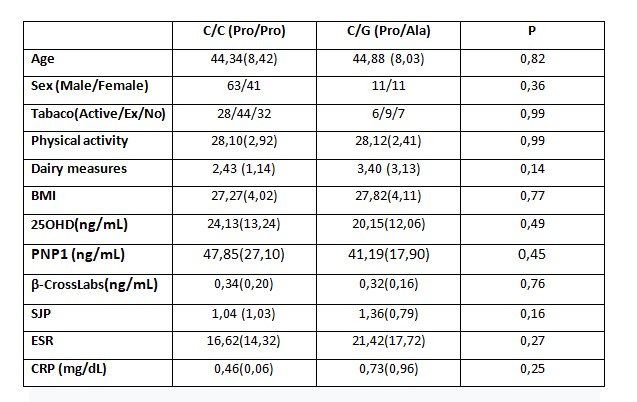Session Information
Date: Sunday, November 8, 2020
Session Type: Poster Session C
Session Time: 9:00AM-11:00AM
Background/Purpose: In the pathogenesis of psoriatic arthritis (PsA), increased inflammatory cytokines lead to increased RANGO-L activity and stimulation of osteoclasts, leading to osteoporosis. This comorbidity, closely related to other inflammatory joint diseases, has not been so documented in patients with PsA. Obesity is a frequent comorbidity in patients with PsA, in addition to being the basis of the metabolic syndrome, it affects the activity of the disease and the response to treatment. PPAR g is a nuclear receptor that behaves like a ligand-activated transcription factor, involved in processes such as inflammation, adipogenesis, or bone metabolism. Objective: Relate PPARg polymorphism (rs1801282) with osteoporosis, inflammatory activity, and obesity in a group of patients with psoriatic arthritis (PsA).
Methods: We analyzed the Pro12Ala polymorphism of the PPARg gene in 126 patients with PsA. To assess osteoporosis, bone mineral density in the spine and hip (BMD) and markers of bone formation and resorption (PNP1 and β-CrossLabs respectively) were measured. As variables that influence BMD, the units of dairy consumed daily, smoking (non-smokers, ex-smokers, and active smokers) and physical activity were measured. Inflammatory activity was measured by the number of swollen joints (SJP), the rate of globular sedimentation (ESR) and the C-reactive protein (CRP). For obesity, the body mass index (BMI) was measured. All patients with any disease or treatment that could alter phospho-calcium metabolism were excluded.
Results: 82.5% of the patients presented a homozygous C / C genotype (Pro / Pro), the rest a heterozygous C / G genotype (Pro / Ala). The baseline characteristics of the patients, the factors that influence BMD, BMI, markers of bone formation and resorption, and the inflammatory variables are shown in Table 1.
Patients carrying the alanine allele showed a lower BMD in the hip compared to those carrying the proline allele (0.84 + 0.07 vs. 0.89 + 0.12; p < 0.01). We did not find this significance for BMD in the lumbar spine (0.96 + 0.6 vs. 1.01 + 0.16; p = 0.34).
Conclusion: The alanine allele of the Pro12Ala polymorphism of the PPARg gene may represent, in patients with PsA, a genetic marker related to osteoporosis. Studies with a larger sample size can demonstrate whether this effect is due to a direct action on the bone or associated with an increase in inflammation.
To cite this abstract in AMA style:
Compán O, Acosta M, Pastor S, Manzano Canabal G, Gomez-Lechon Quiros L, Hidalgo Calleja C, Cubino N, Usategui R, Gonzalez Sarmiento R, Martinez Gonzalez O, Turrión A, Del Pino-Montes J, Montilla Morales C. Relationship of the Pro12Ala Polymorphism of the PPARg Gene with Inflammatory Activity, Osteoporosis and Obesity in Patients with Psoriatic Arthritis [abstract]. Arthritis Rheumatol. 2020; 72 (suppl 10). https://acrabstracts.org/abstract/relationship-of-the-pro12ala-polymorphism-of-the-pparg-gene-with-inflammatory-activity-osteoporosis-and-obesity-in-patients-with-psoriatic-arthritis/. Accessed .« Back to ACR Convergence 2020
ACR Meeting Abstracts - https://acrabstracts.org/abstract/relationship-of-the-pro12ala-polymorphism-of-the-pparg-gene-with-inflammatory-activity-osteoporosis-and-obesity-in-patients-with-psoriatic-arthritis/

